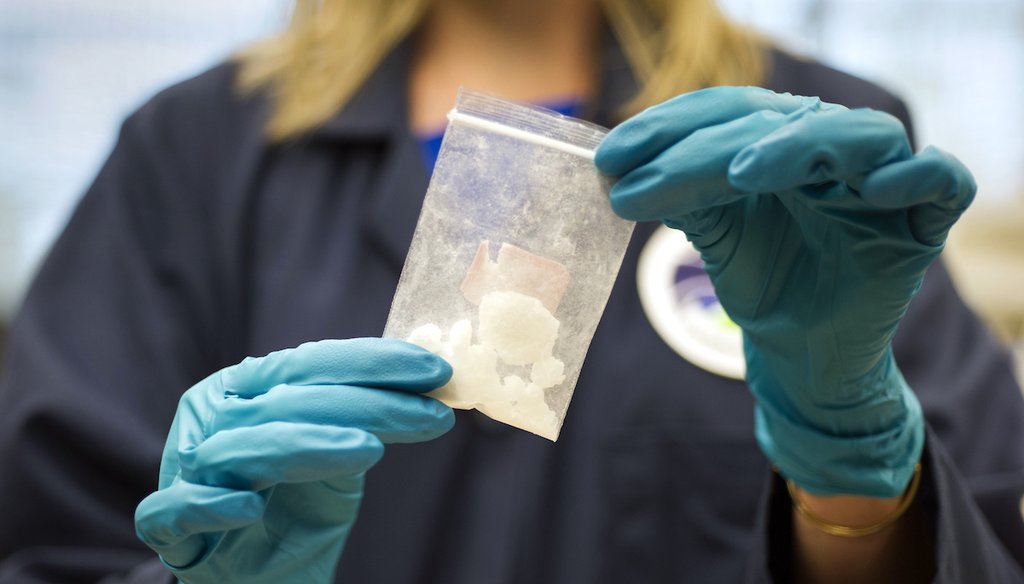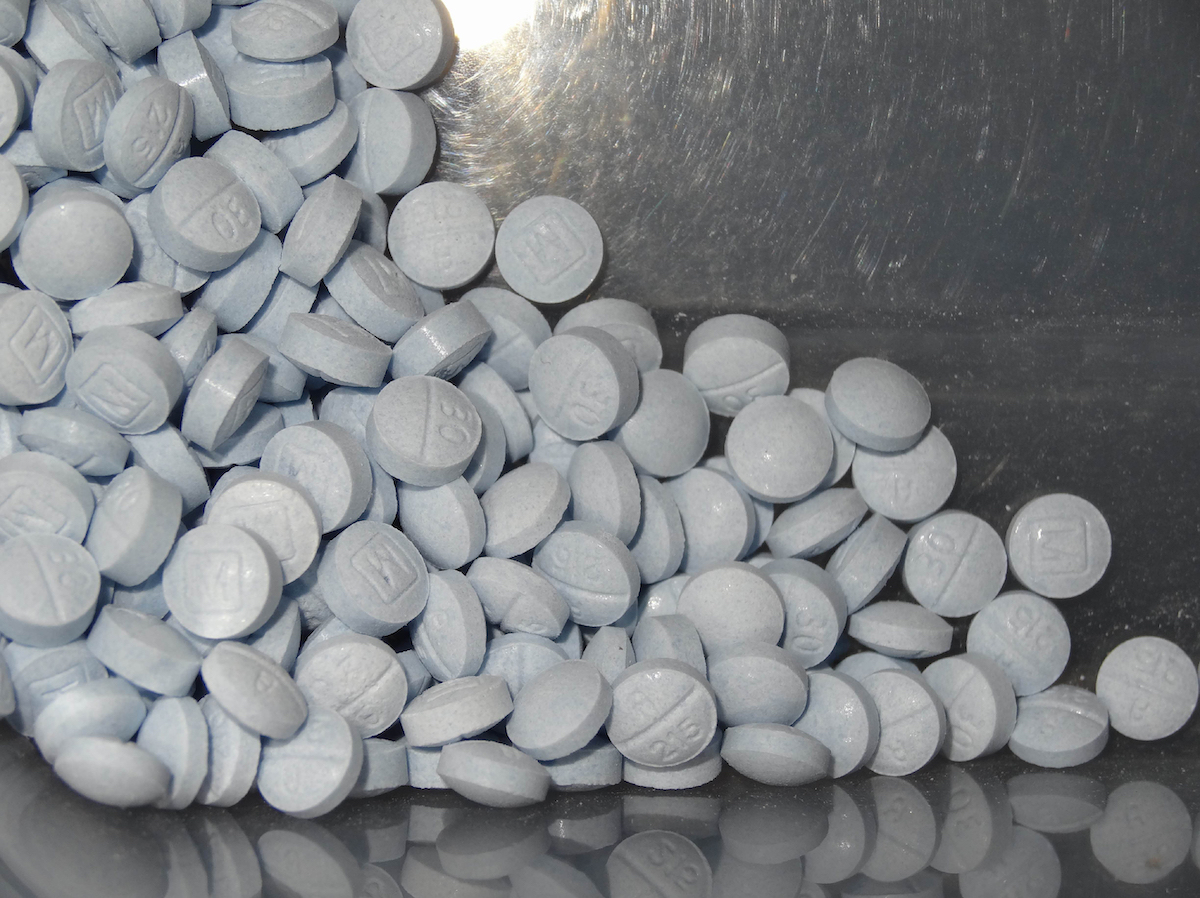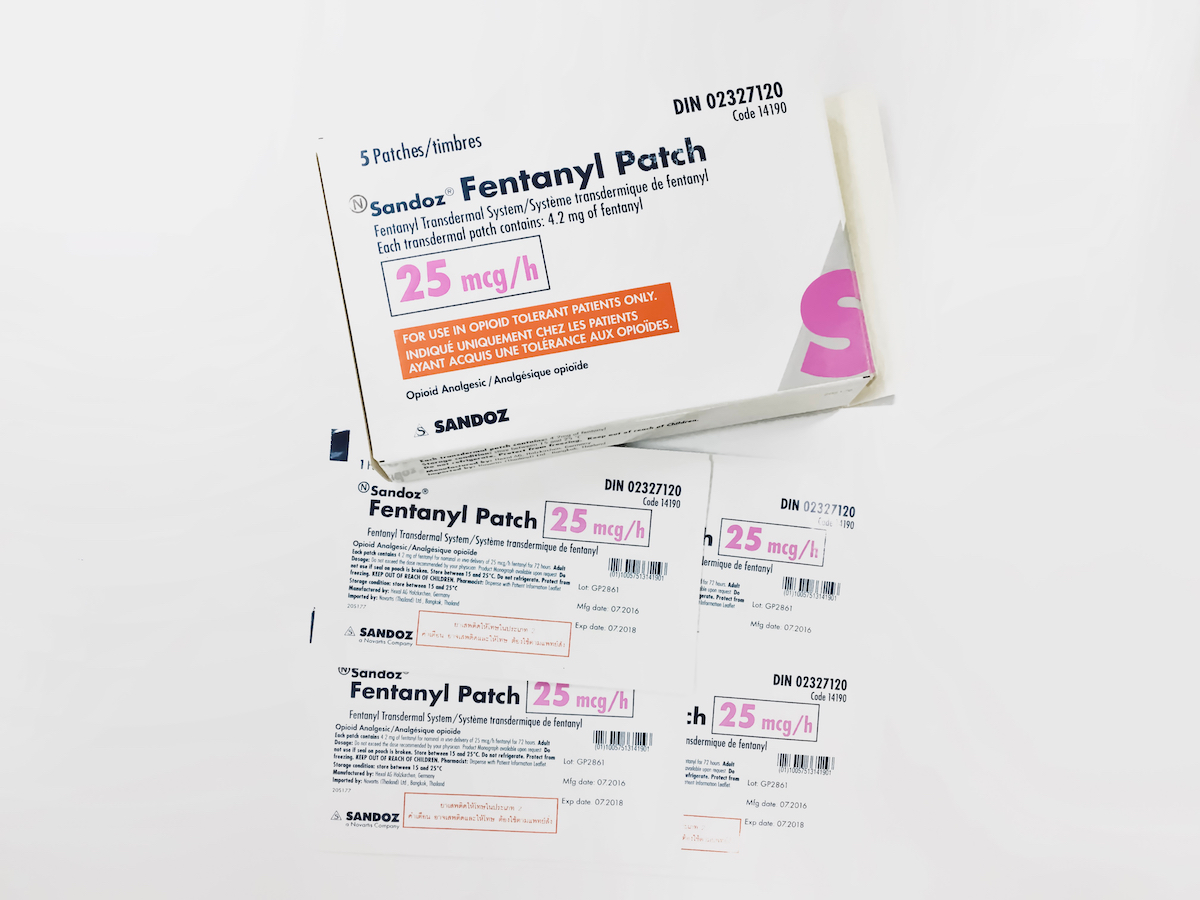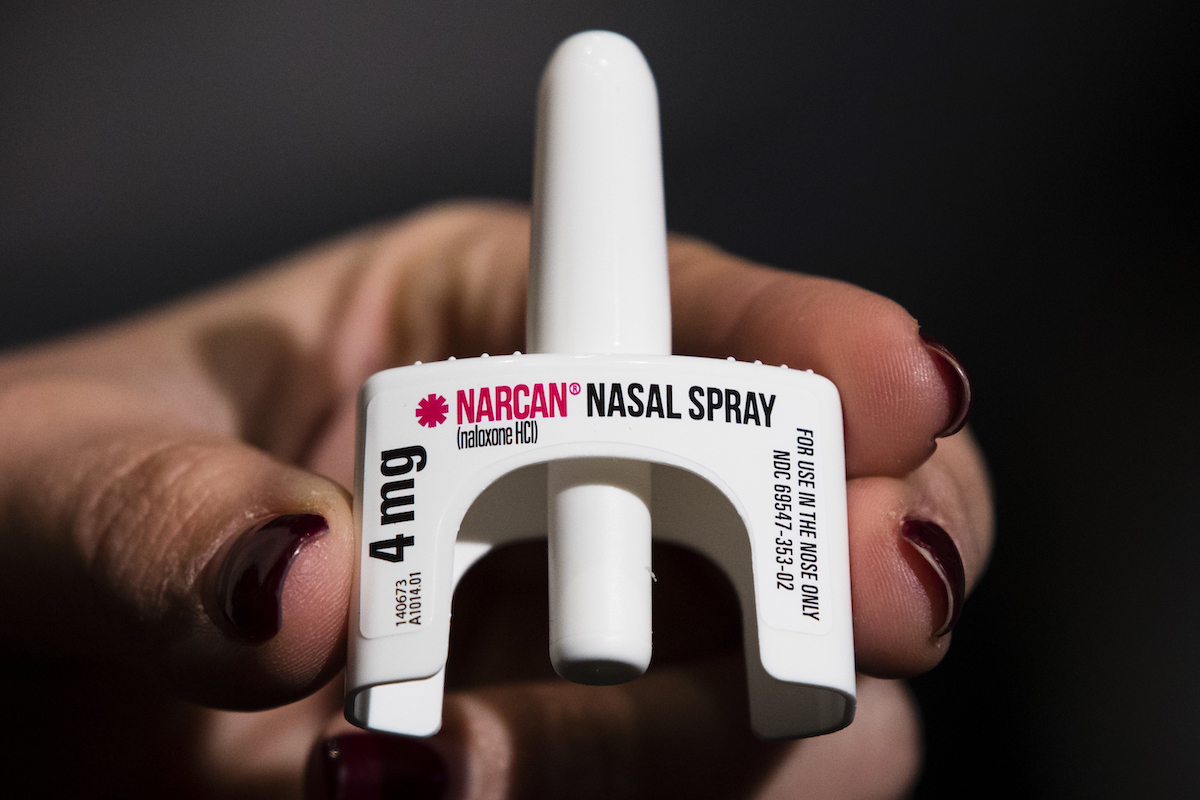Get PolitiFact in your inbox.

A bag of 4-fluoro isobutyryl fentanyl that was seized in a drug raid is displayed at the Drug Enforcement Administration (DEA) Special Testing and Research Laboratory in Sterling, Va., on Aug. 9, 2016. (AP)
If Your Time is short
-
There are two types of fentanyl: medical and illicit. Both are synthetic opioids.
-
Fentanyl is not well-absorbed by the skin, so people can’t overdose by accidentally touching illicit fentanyl, which typically comes in pill or powder form.
-
Medical fentanyl takes different forms, including shots, patches on the skin or lozenges. The medical patches adhere to skin, and the skin slowly absorbs the opioid.
-
Naloxone, sold under the brand name Narcan, is a medicine that reverses overdoses from opioids like fentanyl.
Fentanyl is a potent and lethal synthetic opioid, causing the majority of opioid overdoses in the U.S., according to the Centers for Disease Control and Prevention.
Despite being the subject of many news stories and political talking points, the drug is still the source of a lot of confusion. PolitiFact recently dispelled common myths about fentanyl, including that unintentional exposure to the drug in its pill or powder form can cause an overdose.
We asked you, our readers, to send us your questions about fentanyl. Here are answers to the most commonly asked questions.

This photo provided by the U.S. Attorney's Office for Utah and introduced as evidence in a 2019 trial shows fentanyl-laced fake oxycodone pills collected during an investigation. (AP)
Reader question: What’s the difference between "street fentanyl and medical fentanyl in hospitals?"
There are two types of fentanyl: pharmaceutical (what our reader called "medical fentanyl"), and illicit (which the reader called "street fentanyl"). Medical fentanyl also is a synthetic opioid, according to the CDC.
Medical fentanyl is prescribed by doctors to treat severe pain after surgery or in the late stages of cancer. It can be administered through a shot, a patch on the skin or a lozenge.
"Fentanyl is an old, well-understood drug that is used safely" every day in medicine, said Dr. Ryan Marino, a Case Western Reserve University toxicologist and emergency room physician who studies addiction. "It is one of the most valuable and most" commonly used "medical therapeutics."
Illicit fentanyl, on the other hand, is made in clandestine labs and is the version of the drug most closely associated with overdose deaths. Illicit fentanyl, according to the Drug Enforcement Administration, can be sold as a powder, pill or nasal spray.
Reader question: If you can’t absorb fentanyl through the skin, why are there fentanyl patches?

Fentanyl patches are used to treat severe pain after a surgery or in the late stages of cancer, July 31, 2018. (Shutterstock)
Despite viral stories of police officers or emergency responders supposedly overdosing or getting sick through unintentional contact with fentanyl, experts say it’s not scientifically possible. Fentanyl isn’t well absorbed by the skin, especially in its illicit forms.
However, medical fentanyl is sometimes administered through skin patches. But experts say this isn’t evidence that you can get sick by touching fentanyl in powdered or pill form.
For example, even though there are nicotine patches, your skin can’t absorb nicotine by touching tobacco, "and the same principle applies to fentanyl," according to a report from Brandon Del Pozo, a Brown University public health expert.
With medical fentanyl patches, the skin slowly absorbs the opioid over the course of hours, the American Medical Association said. These patches can’t quickly deliver a high dose of fentanyl.
However, the Food and Drug Administration warns about the possibility of children accidentally overdosing after exposure to fentanyl patches. According to the Mayo Clinic, if you touch the sticky side of a fentanyl patch you should contact a medical professional and rinse the area with water.
Reader question: Does naloxone work on fentanyl overdoses in the same way it does for other opioids?

The overdose-reversal drug Narcan is displayed during training for employees of the Public Health Management Corp. on Dec. 4, 2018, in Philadelphia. (AP)
Naloxone, a medicine commonly sold under the brand name Narcan, reverses opioid overdoses, according to the National Institute on Drug Abuse. Naloxone is administered via nasal spray or injection. Sometimes multiple doses are needed, depending on the strength of the opioid.
The National Institute on Drug Abuse says friends, family members and bystanders can give a person naloxone in case of an opioid overdose. However, the person should still seek emergency medical assistance. Naloxone reverses an opioid overdose for 30 to 90 minutes, so it is possible overdose symptoms can return once the treatment wears off.
Reader question: How much fentanyl is deadly?
The DEA says that as little as 2 milligrams of fentanyl can be deadly for an adult. However, a dose’s lethality can vary based on height, weight and tolerance from past exposure.
Fentanyl’s potency is what makes it so lethal.
Reader question: Does all illicit fentanyl come from the southern border?
Most illicit fentanyl in the U.S. comes from Mexico, mainly smuggled by U.S. citizens. Illicit fentanyl seizures are higher at official ports of entry than in between ports of entry, U.S. Customs and Border Protection data shows.
However, illicit fentanyl also arrives in the U.S. by mail, passenger boats, cargo ships, commercial planes and drones, according to a report from Rand Corp., a global policy think tank. Most of the illicit fentanyl that comes from Mexico is made in labs using chemicals from China, the Rand Corp. report said.
Reader question: Is it true that enough fentanyl has been seized at the southern border to kill every American?
Politicians, news reports and government agencies often cite federal fentanyl seizure statistics to claim that enough is seized to kill a high number of people. For example, in January, the DEA said that in 2022 it seized enough illicit fentanyl nationally to kill every American.
PolitiFact has rated similar claims Mostly True.
However, there are some caveats. As we mentioned before, certain characteristics, such as a person’s weight, can affect lethality. Also, it’s unclear how pure all the seized fentanyl is, which can also affect lethality, Timothy J. Pifer, the director of the New Hampshire State Police Forensic Laboratory and a specialist on fentanyl’s lethality, told PolitiFact in 2019.
Just because enough fentanyl has been seized to kill every American does not mean every American has the same chance of dying of a fentanyl overdose, said Dr. Andrew Stolbach, a toxicologist and emergency doctor at the Johns Hopkins Hospital.
"That would assume that all that drug was somehow going to get into everybody," Stolbach said.
Stolbach said there’s likely enough water to drown everybody in the world. But that doesn’t mean everyone is going to drown.
Our Sources
Centers for Disease Control and Prevention, Understanding Drug Overdoses and Deaths, accessed Sept. 8, 2023
PolitiFact, Common myths about fentanyl debunked: No, you can’t accidentally overdose by touching fentanyl, Sept. 4, 2023
Centers for Disease Control and Prevention, The facts about fentanyl, accessed Sept. 8, 2023
National Institute on Drug Abuse, What is fentanyl?, accessed Sept. 8, 2023
Drug Enforcement Association, Facts About Fentanyl, accessed Sept. 8, 2023
Health and Justice, Can touch this: training to correct police officer beliefs about overdose from incidental contact with fentanyl, Nov. 24, 2021
University of California Davis, Fentanyl facts, overdose signs to look for, and how you can help save a life, Jan. 11, 2023
American Medical Association, Dispelling Myths of Bystander Opioid Overdose, accessed Sept. 8, 2023
National Library of Medicine, ACMT and AACT Position Statement: Preventing Occupational Fentanyl and Fentanyl Analog Exposure to Emergency Responders, Aug. 25, 2017
Federal Drug Administration, Accidental Exposures to Fentanyl Patches Continue to Be Deadly to Children, accessed Sept. 8, 2023
Mayo Clinic, Fentanyl (Transdermal Route), accessed Sept. 8, 2023
National Institute on Drug Abuse, Naloxone DrugFacts, accessed Sept. 8, 2023
Drug Enforcement Association, Facts About Fentanyl, accessed Sept. 8, 2023
PolitiFact, Ask PolitiFact: Do rising fentanyl seizures at the border signal better detection or more drugs?, March 20, 2023
Rand Corp., Commission on Combating Synthetic Opioid Trafficking Final Report, Feb. 8, 2022
PolitiFact, Would one fentanyl seizure be able to kill every West Virginian 32 times over?, March 6, 2019
The Washington Post, DEA seized enough fentanyl to kill every person in the U.S. in 2022, Dec. 20, 2022
Drug Enforcement Association, DEA Washington Division Announces the Seizure of Over 8 Million of Deadly Doses of Fentanyl in 2022, Jan. 26, 2023
PolitiFact, Can the fentanyl seized by officials at U.S. borders kill every American seven times over?, April 27, 2022


































